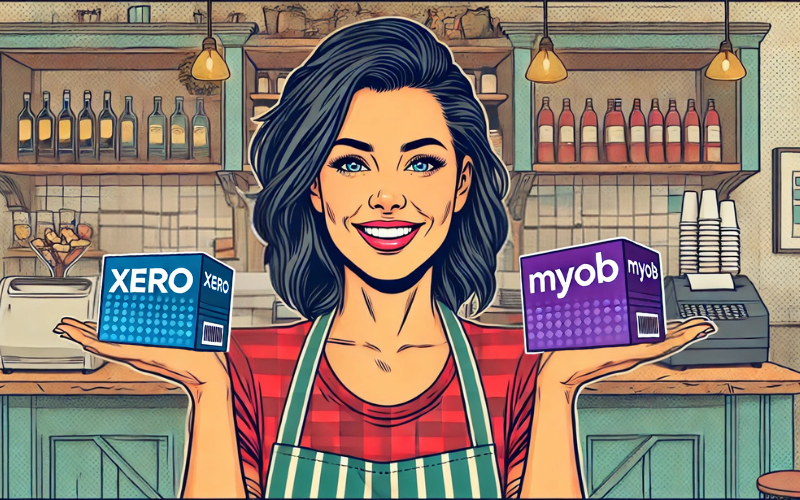When it comes to accounting software for Australian businesses, Xero and MYOB are two of the most popular choices. Each platform offers a range of features designed to help businesses manage their financials, track expenses, and stay compliant with ATO regulations. But which one is the better fit for your business?
Our team at Cotchy chooses Xero for our clients due to ease of use and automation capabilities. It’s important to consider your unique business needs before making a decision. In this article, we’ll compare Xero vs MYOB, breaking down features, pricing, integrations, and key differences to help you decide which is right for you.
Choosing the Right Accounting Software for Your Business
– Xero vs MYOB
Xero vs MYOB: Key Features Breakdown
Both Xero and MYOB offer core accounting features, including invoicing, bank reconciliation, payroll, and financial reporting. However, the way they approach these functions differs:
Xero: Cloud-Based Simplicity
- User-Friendly Interface: Designed for ease of use with an intuitive dashboard.
- Real-Time Data: Fully cloud-based software with offline access via cached browsing and mobile apps. Being cloud-based means businesses can access accounts anytime, anywhere.
- Automated Bank Feeds: Transactions sync automatically, reducing manual data entry. You can access real-time expense tracking and tax reporting.
- Scalable: Works for sole traders to large businesses with custom add-ons.
- Compliance: Supports STP Phase 2, payroll, super, and ATO compliance.
- Integrations: Includes basic inventory and job tracking, with third-party apps for advanced needs. There are over 1,000+ apps that can integrate with Xero, including eCommerce, payroll, and CRM software.
MYOB: Traditional with Offline Capabilities
- Desktop & Cloud Options: Offers both cloud and desktop-based accounting solutions.
- Payroll & Tax Compliance: Strong focus on payroll, including STP Phase 2 compliance.
- Industry-Specific Features: Includes job tracking, inventory management, and complex reporting tools.
- Offline Capabilities: Useful for businesses that prefer a hybrid model of desktop and cloud access.
Xero excels in automation and ease of use, streamlining bookkeeping with AI-driven features, while MYOB caters more to businesses needing complex payroll and inventory management.
Pricing Breakdown: Which is More Cost-Effective?
Cost is a key factor when choosing accounting software. You can find the pricing details for Xero and MYOB on their respective websites:
- Xero Pricing: https://www.xero.com/us/pricing-plans/
- MYOB Pricing: https://www.myob.com/au/pricing
Here’s how Xero and MYOB currently compare at February 2025:
- Xero provides unlimited users on all plans, whereas MYOB limits users on its lower-tier plans.
- Xero’s pricing is transparent, while MYOB offers multiple versions, making direct comparison trickier.
For businesses that require payroll functionality, MYOB can become more expensive as additional employees are added. Xero’s flat-rate pricing makes budgeting easier.
Please note; It is advisable to review the latest information directly on their websites to choose the plan that best suits your requirements.
Integrations & Automation Capabilities
One of Xero’s biggest advantages is its extensive app marketplace, offering over 1,000 integrations with software like HubSpot, Stripe, Shopify, and Square. MYOB also has integrations but is more limited in comparison.
- Xero’s automation tools help streamline bookkeeping, with AI-powered reconciliation and invoice reminders.
- MYOB has strong built-in features, but its app ecosystem isn’t as broad.
For businesses looking for efficiency and automation, Xero’s third-party compatibility makes it the more flexible option.
Xero vs MYOB: Which Software is Best for Your Industry?
Xero is Best for:
- Small to medium-sized businesses (SMBs) looking for an easy-to-use, cloud-based solution.
- Larger businesses with complex payroll and inventory needs, leveraging third-party integrations for multi-location stock, batch tracking, and timesheets.
- Service-based businesses (freelancers, consultants, agencies) that need automated invoicing, expense tracking, and project management.
- Retail, manufacturing, and trade businesses that require job tracking, payroll, and inventory management, with integrations for advanced features.
- Businesses that require automation and real-time data access, with AI-driven features for reconciliation, payroll, and reporting.
- Companies with multiple users needing collaborative cloud access, allowing seamless remote work.
MYOB is Best for:
- Larger businesses that need inbuilt payroll and inventory features without relying on third-party apps.
- Retail, manufacturing, and trade businesses requiring job tracking within their accounting software.
- Companies needing a desktop-based solution with cloud backup, offering offline functionality alongside cloud syncing.
Final Thought: The team at Cotchy believe Xero is the better choice for businesses prioritising automation, cloud flexibility, and integrations, while MYOB suits businesses needing a hybrid desktop-cloud setup with built-in payroll and inventory.
Expert Recommendation: Which Is Right for You?
Xero vs MYOB – They both offer strong accounting solutions, but the best choice depends on your business size, industry, and software needs.
We choose Xero for Cotchy clients because it offers:
- A modern, cloud-first solution with real-time access
- Easy automation, bank feeds, and AI-powered tools that streamline bookkeeping
- A user-friendly dashboard with seamless integrations for payroll, invoicing, and reporting
MYOB may be better suited if you need:
- Desktop accounting with cloud backup for offline access
- Advanced inventory and job tracking without relying on third-party apps
- Payroll-heavy features designed for larger teams
While MYOB remains a widely used option, we find that Xero’s automation, integrations, and ease of use make it the better long-term solution for most businesses. However, every business is unique, and we encourage you to explore both options to determine the best fit for your needs.
Need Help Choosing? Let’s Chat!
If you’re still unsure about which accounting software is best for you, our team at Cotchy is happy to help. Contact us today to discuss your bookkeeping needs and find the best solution for your business!

